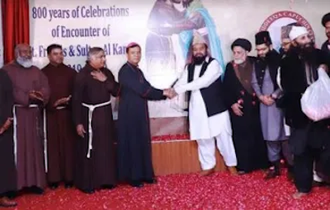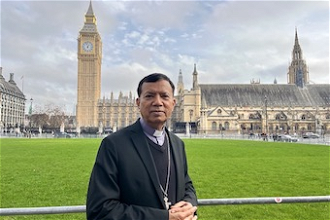Ian Linden: Christians and Muslims walking together in hope

Ceremony held in Pakistan to commemorate 800th anniversary of the historic meeting between St Francis of Assisi and the Sultan of Egypt, AL-Kamil
In a world riven by conflicts in which religious identity plays a significant part interfaith dialogue is not an abstract idea. Pope Leo in a speech to representatives of world religions and members of the diplomatic corps, Walking Together in Hope, celebrated the 60th anniversary of Nostra Aetate signed near the end of the Second Vatican Council in 1965. Subtitled 'Declaration on Relations with Non-Christian Religions', it came from Pope John XXIII asking Cardinal Bea to present a treatise to the forthcoming Council transforming centuries of Christian antisemitism into friendly dialogue with Judaism. Following Pope Paul VI's creation of a Secretariat for Non-Christians in May 1964, the interventions of bishops from Muslim countries at the Council contributed to making Nostra Aetate a mandate for wider, more inclusive, inter-religious dialogue.
Though the bishops in the Middle East remained influential, Africa was arguably the most important testing ground for the Church's commitment to interfaith dialogue, and on a visit to Uganda in 1969 Paul VI made his first address to a Muslim audience. In West Africa Christianity had moved inland from the coast after the mid-19th century to meet Islam from North Africa along a wide belt south of the Sahara.
At the end of August 1965, Paul VI appointed Father Francis Arinze Archbishop of Onitsha, in predominantly Catholic Biafra, just before war broke out with the Federal Republic supported by the Muslim-majority North. From 1984-2002, Arinze led the Secretariat for Non-Christians, then, became President, as it was renamed in 1988, of the Pontifical Council for Inter-Religious Dialogue (PCID).
The Society of Missionaries of Africa MAfr, known as the White Fathers, had to compete with Islam. In 1972, they fielded an Arabic scholar, born in Walsall, Father Michael Fitzgerald, now Cardinal, as a consultor for the Secretariat for Non-Christians, bringing expert advice from his time in Tunisia, Uganda and Sudan. From 1987-2002 he worked as its Secretary then as successor to Arinze as President of PCID. Pope Benedict XVI made him Nuncio to Egypt in March 2006, downgrading the PCID and combining it with the Vatican body for culture. It was ill-judged. He separated them again and, in 2017, the redoubtable Cardinal Jean-Louis Tauran took over interfaith relations.
That November, King Abdullah Abdulaziz of Saudi Arabia visited Benedict. Faced by an internal threat from Al-Qaeda, the King was, on the face of it, promoting tolerance of diversity and dialogue with other faiths. His endeavours came to fruition in 2012 with the launching of the King Abdullah Interfaith Centre (KAICIID) in Vienna, a joint venture with the Austrian and Spanish governments. Alongside UN Secretary-General Ban-ki-Moon and religious leaders from around the world, the three Foreign Ministers of Austria, Spain and Saudi Arabia attended, forming the Council of Parties, its governing body. Cardinal Tauran, mentally as sharp as a razor, physically already bearing Parkinson's disease with fortitude, spoke briefly. The Vatican would remain a 'founding observer' with the Council of Parties until Saudi Arabia permitted churches to be built.
The Church's caution is well-founded. Unsaid is dialogue can also be manipulated for political ends, even when all those involved are acting in good faith. Authoritarian regimes are often concerned about their public image. Set-piece sessions, government-sponsored Institutes of Interreligious Dialogue, not inadvertently, can give the appearance of tolerance and openness in a political system based on repression.
This was a lesson I learned from participating in several delegations to Tehran, 2000-2006, for dialogue with Shi'a scholars, under Anglican Church to Foreign Office auspices. Our interlocutors discussed post-modernism, youth's indifference to religion, western feminism, the 'last times', eschatology, the Virgin Mary, conspiracy theories about 9/11. One told us - through a struggling translator- about his conversation with 'a pop-singer' in Rome - correctly translated 'Ratzinger'. We were taken to the extraordinary underground Shi'a archives in Qom, and to meet Grand Ayatollah Hossein Mazaheri in Isfahan who gave his condolences for a recent terrorist bombing in London.
A visit in February 2006 was ill-timed, coinciding with the delayed reaction to the September 2005 publication of 12 cartoons in the Danish newspaper Jyllands-Posten. Muslims were deeply offended by its portrayal of the Prophet Muhammad. Our delegation was informed in an announcement by a Hujjat-al-Islam, an honorific title one below Ayatollah, that the Danish Government were ordering the cartoons be sent to all schools in Denmark. It was a glimpse of how conspiracy obsessions and political manipulation worked in Iran. Most of those we met, including - later - President Khatami who initiated the dialogues, had honorable intentions. But under the then new President of Iran, Mahmoud Ahmadinejad, the hidden hand was all too visible.
Such is interfaith dialogue at high institutional level, necessarily formal, a distinctive aspect of diplomacy. Erudite papers are given. Church officials scrutinise final joint statements, a comma out here, a semi-colon in there. Mutual understanding and new relationships may grow during meals and after sessions.
Without dialogue taking place at a more grass roots level much of the high-level effort by the Churches would be limited in impact. Institutional dialogue doesn't appear as Pope Leo's focus in his address on Nostra Aetate: rather, dialogue inspired by encounters in everyday life creating a particular texture of society and the common good.
Interfaith dialogue is not transactional, but a lifelong commitment in a world of diversity: listening, explaining, understanding, finding shared goals. In Pope Leo's words in Walking Together in Hope: "dialogue is not a tactic or a tool, but a way of life - a journey of the heart that transforms everyone involved, the one who listens and the one who speaks".
In 2014, I undertook peace-building work in the UK with a group of 15 Muslim Nigerians and 15 Christian Nigerians from the northern States. Relationships at first were tense. This was not surprising. Leaders of large Pentecostal Churches were speaking informally for the first time with their Muslim neighbours, one or two of whom were radical in their views, against a background of discrimination, and sometimes violence, against Christians. A visit to Sheikh Ibrahim Mogra's mosque in Leicester broke the ice. A meal together, then we sat around the mosque on the carpet and Ibrahim gave a moving welcoming speech. One of the Pentecostal leaders got up and whispered something in his ear. Ibrahim, surprised, came over and told me he'd asked for a Qur'an. We instantly agreed he should have one. Ibrahim placed the Qur'an in the Pentecostal leader's hands respectfully outstretched, palms upwards. Suddenly conscious what he had done so publicly, he blurted out: "I was born a Christian, I have lived as a Christian and I will die as a Christian [pause]. But I want to understand". And sat down.
Days later, in a closing ceremony at Westminster Abbey, in front of the group assembled in the Jerusalem Chamber, a leading Muslim woman asked for a Bible. I rushed out and bought a King James Bible in the bookshop; a touching moment, she received it in the room where the Bible's final edit pre-publication took place in 1611.
Two groups "walking together in hope" when, in Leo's words, "hearts open, bridges are built and new paths appear where none seemed possible"? I hoped so. At least for a while.
Professor Ian Linden is Visiting Professor at St Mary's University, Strawberry Hill, London. A past director of the Catholic Institute for International Relations, he was awarded a CMG for his work for human rights in 2000. He has also been an adviser on Europe and Justice and Peace issues to the Department of International Affairs of the Catholic Bishops Conference of England and Wales. Ian chairs a new charity for After-school schooling in Beirut for Syrian refugees and Lebanese kids in danger of dropping out partnering with CARITAS Lebanon and work on board of Las Casas Institute in Oxford with Richard Finn OP. His latest book was Global Catholicism published by Hurst in 2009.
LINKS
Ian Linden: www.ianlinden.com/latest-blogs/


















